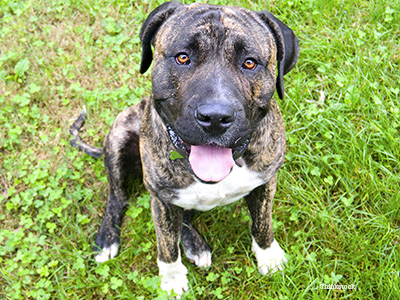Overview
Hypothyroidism is the most common hormonal disorder diagnosed in dogs. It occurs when the thyroid glands, located near the throat, are unable to produce enough thyroid hormone.
Thyroid hormone helps regulate and control normal bodily processes. Think of it as an engine gauge: in simple terms, it controls how fast or slow the body functions. When a dog’s thyroid gland becomes underactive and produces too little thyroid hormone, the engine gauge is on low, leading to a decrease in the body’s metabolism.
Risks
The exact cause of hypothyroidism is not known. This disease can affect dogs of any age, male or female, and tends to be more common in larger breeds.

Symptoms
What should you keep an eye out for if you suspect your canine friend is hypothyroid? The most common symptom is a decrease in energy or activity level.
Other signs may include:
- Weight gain without an increase in food consumption
- Lethargy
- Sensitivity to cold
- Hair loss or excessive shedding
- A recurring skin and/or ear infection
Diagnosis
So what do you do if you suspect your dog is hypothyroid? Contact your veterinarian. He/she can run some simple tests to determine if your friend has this disorder.These may include:
- Urine tests to rule out urinary tract infection and to evaluate the ability of the kidneys to concentrate urine
- Chemistry tests to evaluate kidney, liver, and pancreatic function, as well as sugar levels
- A complete blood count to rule out blood-related conditions
- Electrolyte tests to ensure your dog isn’t dehydrated or suffering from an electrolyte imbalance
- A thyroid test, which determines if the thyroid gland is producing too little thyroid hormone
Additional tests may be added on an individual basis. Your veterinarian will recommend the right treatment for your pet.
Treatment
If your dog is diagnosed with hypothyroidism, your veterinarian will most likely discuss medication options for her.
Oral medication is the most common way of treating canine hypothyroidism. With daily doses of synthetic thyroxin, your dog’s symptoms should resolve within several weeks and her engine gauge should return to normal. This medication is inexpensive, well-tolerated, and usually given once or twice a day. Once your dog begins medication, she will most likely continue taking it for the remainder of her life.
Your veterinarian will most likely schedule periodic blood tests to measure the levels of thyroid hormone in your dog’s body, so that the dosage can be monitored and adjusted, if necessary.
Prevention
If your dog was diagnosed with hypothyroidism, there is no one to blame! Watch this video to learn more about hypothyroidism in dogs. Remember, even experts are unsure why some dogs become hypothyroid. Diagnosing and treating your best friend effectively will allow her to live a long and healthy life!
If you have any questions or concerns, you should always visit or call your veterinarian – they are your best resource to ensure the health and well-being of your pets.
